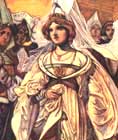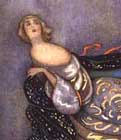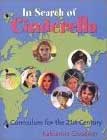
Cinderella:
345 Variants
by Marian
Roalfe Cox
SurLaLune's
Cinderella Area
SurLaLune Fairy Tales Main Page
101
La Société de Litterature Finnoise. MS. Collections. By Kaarle Krohn. No. 6014. (From Suojärvi, in Carelia. Narrated in 1884 by a middle-aged woman.)1
[NO TITLE]
ABSTRACT
Heroine and mother wash clothes by the shore; ogress persuades mother to throw her a long-sleeved shirt; on this she and her daughter ride across from tongue of land--Ogress transforms mother into sheep, takes her place, and kills sheep-- Trans formed mother help--Three birch trees grow from three drops of sheep's blood caught by heroine--Ill-treated heroine (by ogress stepmother)--Tasks, to mend oven and sort grain; performed by cross-wise striking with three-year-old, six-year-old, nine-year-old twigs--Magic dresses--Meeting-place (Czar's banquet)-- Czar's son cares for heroine's horse--Heroine throws bone at ogress's daughter, breaking (1) her foot, (2) her hand, (3) putting out her eye--She afterwards boasts of attentions received from Czar's son--[Threefold flight]--Pitch traps--Lost (1) hat, (2) glove, (3) shoe--Hat, glove, and shoe marriage tests--Heroine sent away to tend cattle--Mutilated head, fingers, foot--Czar's son and ogress's daughter set out in boat to wedding--Witness. Heroine as shepherdess denounces false bride, whom Czar's son throws into brook--Happy marriage--Ogress visits heroine after birth of son; rescues own daughter from brook--Substituted bride--Heroine transformed into reindeer; persuades shepherd to bring her child to forest; suckles it--Shepherd tells Czar's son, who seeks counsel of old widow--Husk cast by heroine burnt by Czar's son--Heroine cannot follow reindeer without it; goes home with husband--Villain Nemesis. Ogress and false wife cast into flaming pit.
TABULATION
(1) An old man and an old woman have a daughter. Man goes into the forest; woman goes to the shore with daughter to wash clothes. The Syöjätär (the Ogress) calls from a tongue of land, "Hi, woman! fetch me over." "There is no boat on the shore." She runs to a second tongue of land, and calls out in same words; receives the same answer. Similarly she calls from a third tongue of land. Woman replies that there is no boat at hand. "Hand over a towel." Woman says there is not one. "Hand over a girdle." There is not one. "Then throw me over a shirt with long sleeves." She does so. The Syöjätär and her daughter come across on the shirt (they are a light folk). "Either spit in my hand, you whore, and become a reindeer, or pass between my legs and become a sheep." Woman does the latter, and turns into a sheep.-- (2) The Syöjätär goes into the house. The man returns in the evening, and she poses as his wife. "I say, husband, I have got a sheep." "Really? that is nice." "Where shall I keep it?" "On the oven." She puts it there. The man goes into the forest. The Syöjätär remains at home.-- (3) Heroine weeps on the neck of the sheep. "What will become of me, little mother, now you are a sheep?" "What God will." The man returns in the evening. "Do you hear, husband? You must slay the sheep; it bleats so much, my ears cannot stand it." He says, "Take it into the stable." She does so. Again heroine goes and weeps on sheep's neck. The Syöjätär is aware of this, and says to the man that he really must kill the sheep; it bleats so much that her ears cannot stand it. "Oh, let it alone!" he says, and again goes to the forest. Heroine weeps on sheep's neck, and that evening the man is again urged to slay it. "If you won't kill it I shall kill it myself." Man says he will.-- (4) Heroine says to sheep, "What will become of me, little mother, when you are slain? The Syöjätär has ordered for you to be killed, and father is sharpening his knife." "Don't weep, little daughter; when your father comes to slay me, ask to be allowed to hold the light; take with you a clean rag, and when my head is cut off catch the first three drops of blood(Note 2) in the rag, and lay it on the cross-beam of the door." Heroine does as bidden. The Syöjätär objects to her being allowed to hold the light, but father takes her with him. Three beautiful birch-trees grow from the three drops of blood.-- (5) Next morning the Syöjätär wakes the man, and says, "Listen, husband; the magpie is laughing. The Czar's son invites to a banquet. Are you going, or shall I?" "As far as I am concerned you may go; I'm going into the forest." When he has started she gets her daughter ready for the banquet, and says to heroine whilst she smashes the oven and mixes three sorts of grain in the ashes, "Just you see, you whore, that these grains are separated from the ashes, and that an oven much better than the last is in place by the time I get back." Then she goes with daughter to the festival. Heroine clasps the birch-tree, weeping; she melts into water with weeping. "What shall I do now, little mother?" and she tells of her task. "Don't cry, little daughter. Take a three-year-old twig, and strike three times crosswise, and say, 'The grain apart, the ashes apart, and a better oven than before.'"-- (6) She does so, and then weeps again at the birch-tree. The birch-tree asks why. "What shall I do now, little mother?" "Don't cry. Wash yourself on my left side, and dress yourself on my right side; then go to the green meadow, into the open field, and whistle. A horse will come, partly gold and partly silver, and the third colour is unrecognisable and inconceivable." Heroine does as bidden, and rides on the horse, who asks, "Whither shall I go?" "To the banquet of the Czar's son." The Czar's son comes to meet her with a bucket of bread for the horse, and, giving his arm, conducts her to the upper end of the table. She looks indescribably lovely.-- (7) After the soup the Czar's son begins to carve the joints. Heroine says, "Give me a hone, Ivan Tsarovits." "You shall have meat." "The best meat is on the bone." He has not time to give her a bone, so she helps herself to one. She has noticed how the Syöjätär has been squatting like a cat under the table, and her daughter in a corner of the room. She flings the bone towards the door, and hits the daughter, breaking her foot. After the feast heroine prepares to leave.-- (8) Czar's son smears the cross-beam at the upper part of the door with tar, and her hat remains sticking fast to it. She does not concern about it, having a second hat at home. Czar's son follows her out, and brings her horse for her. She rides off to the green meadow, to the open field, leaves the horse standing there, goes home, dresses, and lays herself to sleep in the ashes.-- (9) The others return. "Ah, Cinderella! you sleep here in the ashes," says the Syöjätär, "and don't go to the banquet. My daughter was playing up in the loft of whalebone(Note 3) with the Czar's son, and received a foot-favour (Fuss-Vergnugen). "Indeed! I wish her joy of it. If you like having it, you like to boast of it." "There was another beautiful girl there, but whoever she was the Czar's son didn't give her a single look, but only played with my daughter." "Perhaps that was I." "You! hold your tongue, and don't talk nonsense!" In the evening, when man returns, the Syöjätär tells him how her daughter was playing on the whalebone loft with Czar's son, etc. He makes the same comment as did heroine-- (10) Next morning the Syöjätär runs out into the yard to inspect, then wakes the man. This time she mixes six sorts of grain in the ashes, after smashing the oven. The birch-tree tells heroine to get a six-year-old twig, and six times to strike crosswise with it.-- (11) The Czar's son meets her with a bucket of oats for the horse.-- (12) He smears the door-handle with tar, and heroine's glove is left sticking to it.-- (13) The Syöjätär boasts about her daughter, whose hand is broken, having received a hand-favour.-- (14) Third day she mixes nine sorts of grain in the ashes. Birch bids heroine strike nine times crosswise with nine-year-old twig.-- (15) Czar's son meets her with a bucket of wheat for the horse.-- (16) He tars the threshold, and heroine loses a shoe.-- (17) Syöjätär's daughter, having lost an eye, boasts of eye-favour.-- (18) Czar's son announces that he will wed whomsoever hat, glove, and shoe fit. All go to the assembling to try, but Cinderella is sent off with a sheaf of oats to tend cattle. The trial has lasted for two days, but no one can wear the things; they are either too large or too small. There is to be a third day's trial. The Syöjätär hammers and hammers her daughter's head, snips her fingers, slices her foot, till hat, glove, and shoe go on. Czar's son begins to rue having called the assembly together, but must of course keep his word.-- (19) He goes to the wedding by boat, with two servants to row and one to steer, whilst he sits in the middle of the boat with the bride. The Syöjätär counsels her at starting to give no ear to any shepherds' songs, on no account to stop for them, but to keep on row tug. They row on and on. Heroine sings on a tongue of land:
"Lo! the noble youth, the Czar's son,
Has a snipped foot to lead home;
In the boat a scraped finger,
And a head that has been hammered."
She sings the same from a second promontory. Czar's son asks, "What is that shepherdess singing? she is singing nothing good." After hearing her from a third promontory he makes same remark. Then he takes off the bride's glove; it is full of blood; likewise the shoe and the hat.-- (20) He throws her into a little brook, and tries the things on heroine, whom they fit as though made for her. He sees, too, that she carries a sheaf of oats, the badge of a shepherdess. So he marries her.-- (21) Heroine bears a child. Hearing of this, the Syöjätär sets out to visit her. She comes to the spot where her daughter is lying in brook. A beautiful reed is growing there. She is about to pull it up, thinking, "That will do for little Ivan Thalmoinen to play with." The plant shrieks out, "Little mother, don't tear my heart-strings." "Is that really you?" The Syöjätär digs out a formless mass, already rotting, and takes the cripple to the bath-room. Then she goes to heroine's room as though she were her mother, and says, "They ought to beat a bath for the invalid." Czar's son says, "In the house of the Czar's son there are plenty to do the heating without you." "No doubt; but let me do it now that I am here." She heats the bath-room, and heroine takes her bath. When the room is hot the Syöjätär restores the shapeless cripple. Heroine catches sight of her.-- (22) The Syöjätär then says to heroine, "Either spit in my hand, you whore, and become a reindeer, or pass through between my legs, and become a sheep." Heroine recalls how her mother was changed to sheep, and prefers to become reindeer. She is transformed, and runs off. The Syöjätär softens crippled daughter, moulds her nose and breast, and places her in heroine's stead in corner of the room. But the starved baby cries, and cries unceasingly.-- (23) The shepherd of the Czar's son makes a fire in the forest. A herd of reindeer speeds by, followed by a second and a third herd. Behind the third runs one solitary reindeer. The others begin grazing; the last reindeer comes up to the shepherd by the fire, and asks, "Is my little Ivan Thalmoinen always crying?" Shepherd says, "The child cries at night." "Bring it here to-morrow; I will suckle my Ivan Thalmoinen." Shepherd fears they will not give the child to him. "Say, give me the child that it may hear the leaves rustling and the shepherd singing."-- (24) Next day shepherd asks to take child. They would know why. "That he may hear the leaves rustling and the shepherd singing; perhaps he will sleep the better to-night." He carries child to forest, kindles a fire, and begins to blow his horn. Again the three herds of reindeer pass by. The last reindeer sees the child, and begins to weep. It lays its coverings aside on stone and tree-stump, and comes and suckles the child. But the mother herself weeps-- weeps bitterly-- then says to shepherd, "Bring the child to this same spot to-morrow; to-morrow we shall again come hither; after that the reindeer fare to other lands, and I must follow them. Tomorrow I shall again behold my little Ivan Thalmoinen. But you, betray me not to Ivan Tsarovits." In the evening the shepherd carries the child home, and it sleeps all night long without crying or making a sound.-- (25) Nest morning Czar's son asks shepherd how the child slept after being taken to the wood. The shepherd says, "If you will tell no one, I will tell you." He promises. "Your wife is going about as a reindeer; you are harbouring the Syöjätär's daughter. Naturally the child slept sound, because its mother had suckled it." "How may I get my wife back?" "She lays her coverings on a stone and tree-stump; if you can get hold of these, you will get herself too." Shepherd takes child to forest.-- (26) Czar's son goes to an old widow and relates what he has heard. She advises him to take two servants with hint to carry two heaps of live coal. "Throw the clothing on the burning heaps; without it she cannot run away."-- (27) He follows her counsel, and joins the shepherd, who has lit a fire and is blowing his horn. As before, he herds of reindeer appear, and the last reindeer comes and suckles child. The young mother melts into tears. "Now we must away to foreign lands." Czar's son casts the clothing on the burning heaps, and it is consumed. The young wife weeps and weeps on the skirts of the wood; he sobs also. She asks, "What is this smell of burning?" Shepherd answers, "The Czar's son must be roasting swine today." "But what is that sound like sobbing?" "The pigs cry out at being roasted." The reindeer begin to run off; the young mother prepares to follow them. She clasps her child and sobs, "I shall ace my Ivan Thalmoinen nevermore." She bids farewell to shepherd. "We shall never see each other again." She goes to fetch her clothing, but Cannot find it.-- (28) Czar's son springs forward and clasps her neck. "Now I have you tight." "Ah, yes! but set me free." "Come home." "Nay, husband dear, I cannot. My mother, as a sheep, was slain; I was turned into a reindeer; if I come home now I shall be killed." "Not so . . . to others death is more nigh. Only come home." She is persuaded.-- (29) Czar's son has bath-room heated, a pit dug therein, and filled with tar and fire. Red cloth is spread the whole way thither, also on the bath-room floor, he conducts the false wife and the mother-in-law to the bath-room, the latter in front, the false wife behind on his arm. Mother-in-law says, "You have had red cloth put down we should have been quite content without." "There is enough for your lifetime." Mother-in-law enters bath-room and falls into the flaming pit. The false wife would draw back. The Czar's son pushes her in. "Follow your mother!" and he fastens the door with a bolt, and lets the whole bath-room burn. He takes his true wife back, and they live happily together.
NOTES
1: The conversations, as
a special feature of the Finnish stories, have been here and there retained.
Return to place in text.
Note 62
(P. 379.) With the three drops of blood from
the helpful animal (who is here the transformed mother), compare the three
drops of the mother's blood in Grimm's story of "The
Goose-girl" (No. 89).
Return to place in text.
3: Mr. Kaarle Krohn
furnishes the following explanation: Hange-boden von Fischbein = ein
Boden (Diele) welcher oben in der Stube hangt.
Return to place in text.
Cox, Marian Roalfe. Cinderella: Three Hundred and Forty-five Variants of Cinderella, Catskin, and Cap O' Rushes, abstracted and tabulated. London: David Nutt for the Folklore Society, 1893.
While the original text of this book is out of copyright, the special formatting and compilation available on SurLaLune Fairy Tales is copyrighted. Be aware that while the original content has been honored, page numbering, footnote numbering, redesigned charts, links, and other aspects are unique to this site's version of the text. Use at your own risk. For private and fair use educational purposes only.
©Heidi
Anne Heiner, SurLaLune Fairy Tales
E-mail: surlalune@aol.com
Page last updated February 1, 2006
www.surlalunefairytales.com










